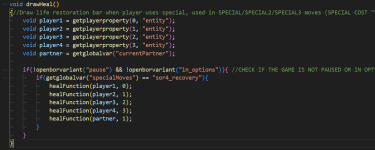maxman
Well-known member
I have a question regarding the way to use for scripting for player index. This one, for example, is that I want to give player index the way @Kratus does in his projects.
I usually made it like this.
What I want is different from what I usually do. It's something that goes like this for having the player part as part of the function here.
This leads me to my question on the player variable/function I use as a new script. Its result is correct as what I previously made. But is giving the player variable/function with its index like this correct (

I usually made it like this.
C:
void main(){
LastoNumber();
}
void LastoNumber()
{
if(openborvariant("in_level"))
{
int P1 = getplayerproperty(0, "entity");
int P2 = getplayerproperty(1, "entity");
int P3 = getplayerproperty(2, "entity");
int P4 = getplayerproperty(3, "entity");
int P1Life = getplayerproperty(0, "lives");
int P2Life = getplayerproperty(1, "lives");
int P3Life = getplayerproperty(2, "lives");
int P4Life = getplayerproperty(3, "lives");
int font = 3; //Standard Life Font
void mStyle = getglobalvar("musicStyle");
if(mStyle == 0){font = 4;} // Green font
if(mStyle == 1){font = 6;} // Red font
if(mStyle == 2){font = 5;} // Blue font
if(P1)
{
drawstring(111, 9, font, P1Life-1);
}
if(P2)
{
drawstring(231, 9, font, P2Life-1);
}
if(P3)
{
drawstring(351, 9, font, P3Life-1);
}
if(P4)
{
drawstring(471, 9, font, P4Life-1);
}
}
}What I want is different from what I usually do. It's something that goes like this for having the player part as part of the function here.
C:
void main(){
lastNumber2(0); // player 1
lastNumber2(1); // player 2
lastNumber2(2); // player 3
lastNumber2(3); // player 4
}
void lastNumber2(int player){
if(openborvariant("in_level")){
int ent = getplayerproperty(player, "ent");
if(ent != NULL()){ // Does this playable entity exist?
int Life = getplayerproperty(player, "lives");
int font = 3; //Standard Life Font
void mStyle = getglobalvar("musicStyle");
if(mStyle == 0){font = 4;} // Green font
if(mStyle == 1){font = 6;} // Red font
if(mStyle == 2){font = 5;} // Blue font
int xPos = 111;
int yPos = 9;
int xAdd = 120;
int align;
if(player == 0){
drawstring(xPos, yPos, font, Life-1);
}
if(player == 1){
drawstring(xPos+xAdd, yPos, font, Life-1);
}
if(player == 2){
drawstring(xPos+xAdd*2, yPos, font, Life-1);
}
if(player == 3){
drawstring(xPos+xAdd*3, yPos, font, Life-1);
}
}
}
}This leads me to my question on the player variable/function I use as a new script. Its result is correct as what I previously made. But is giving the player variable/function with its index like this correct (
(player == 0))? I don't know if it's correct to use this kind since I want the text to be aligned accordingly to each/specific player index based on where it should be located.

